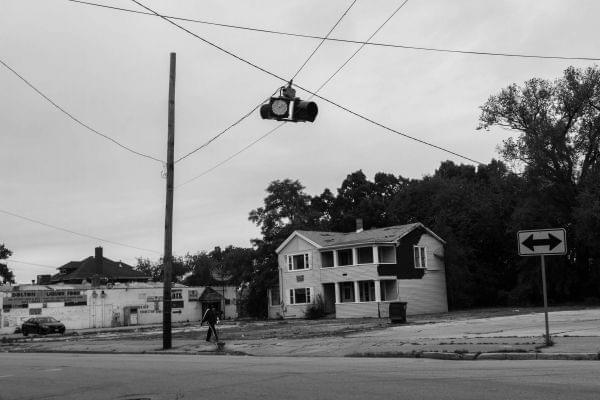Dolton, IL and Suburban Poverty; More Scientists In Congress; Starved Rock Expansion; E-Cigarettes

Vacant homes are common on the northern edge of Dolton’s once-booming downtown. For the first time in American history, poverty in the suburbs has eclipsed urban poverty. Sebastián Hidalgo/WBEZ
On The 21st: There’s been growing poverty in American suburbs for years. WBEZ and the Better Government Association have spent months talking to people in one of these communities - Dolton, Illinois. Plus, the next Congress will have seven new members with science backgrounds. We talk with current Representative Bill Foster and Congressman-elect Sean Casten about what this could mean for the next few years. Plus, Starved Rock and Matthiessen State Parks are expanding by more than 2,600 acres. What could that mean for visitors and for the land itself? And, with e-cigarette sales going up, what do we know about their health effects?
When you think of the suburbs, what comes to mind? Maybe you grew up in one, maybe you live in one now. Perhaps you associate them with safety, community, prosperity?
When we tend think of poverty we associate that with cities. Remember the term inner city? What does it look like to be poor when you live in the suburbs? What kind of services are available?
Miles Bryan from WBEZ and Casey Toner from the Better Government Association have spent the past few months diving into the issue of poverty as it affects one particular Illinois suburb - Dolton. Located on the South Side of Chicago, Dolton has undergone massive social and economic changes over the past 45 years.
How can a place like Dolton be an example of the suburbanization of poverty? Both Miles and Casey joined us from WBEZ in Chicago.
We also spoke with Elizabeth Kneebone. She’s the Research Director at UC Berkeley’s Terner Center for Housing Innovation. She’s also with the Brookings Institute.
More on Dolton & Suburban poverty with @ctoner @miles__bryan @wbez @BetterGov @ekneebone
— The 21st (@21stShow) November 27, 2018
Photos @sebastian_hwc https://t.co/4NOIJCQMYE
Plus-
The newly elected members of the House of Representatives took their class photo last week, providing visual proof of the historic changes voters made during the midterm election. It includes more than 100 women, many women of color and a Muslim representative who wears hijab, Somali American from Minnesota, Ilhan Omar.
But something you can’t see just by looking at an elected official is how many congressmen and women are scientists. Our next Congress will include ten scientists, including several from Illinois.
There’s Lauren Underwood in the 14th district west of Chicago, a registered nurse who was appointed by President Obama as a senior advisor at the US Department of Health and Human Services.
And Sean Casten in the 6th district, also west of Chicago. He has degrees in molecular biology, biochemistry and engineering management and is president of Recycled Energy Development, a company that works to reduce greenhouse gas emissions. He joined us on the line.
And a veteran member of the House, Representative Bill Foster, in the 11th district, an area that includes Naperville and part of Argonne National Laboratory in Lemont. He also spent more than two decades as a physicist at Fermi National Accelerator and right now is the only PhD scientist in Congress. Compare that with the six former talk show hosts who are members. Rep. Foster also joined us on the line.
"If you google my name and the word 'Greenland' you get this article:https://t.co/xKQdng5iyV"
— The 21st (@21stShow) November 27, 2018
- @RepBillFoster on looking forward to getting back to a better understanding of science in government. #climatechange
And-
If you live in Illinois, at one point or another you’ve probably visited Starved Rock or Matthiessen State Park in Oglesby. And you’re not the only one. Every year millions of visitors pass through the parks.
Now, Starved Rock and Matthiessen will be expanding by more than 2,600 acres. Last month, Gov. Rauner announced an $11 million land acquisition from the private company, Lone Star Industries.
For years, college students in geology classes have used parts of that new land: a quarry to collect and study fossils and samples. What might it mean for them now that the quarry will be part of the park?
Mike Phillips joined us on the line, he’s a geology professor at Illinois Valley Community College in Oglesby.
Kerry Novak also joined us. He is the Site Superintendent for Starved Rock and Matthiessen State Parks.
Starved Rock and Matthiessen State Parks will be expanding by more than 2,600 acres. What could that mean for the physical landscape of the park? https://t.co/QjvwVw7i6F
— The 21st (@21stShow) November 27, 2018
Also-
Nearly 11 million Americans use e-cigarettes. That’s still less than a third of the number of Americans who smoke regular cigarettes, but unlike their more traditional counterparts, e-cigarette sales are going up.
They’re also more popular among younger Americans. Here in Illinois, about 27 percent of high-school seniors say they use e-cigarettes.
Right now research suggests that it might be less harmful that smoking but there’s still a lot we don’t know about the long-term effects of vaping. Public officials have been raising concerns, whether it’s the Illinois General Assembly, the federal FDA, or US Senator Dick Durbin, have been taking action on this issue. The state legislature is considering passing a bill that would raise the legal age of cigarette sales from 18 to 21 and this would include e-cigarettes.
Scott Hays is a Senior Research Scientist at the Center For Prevention Research Development at the University of Illinois. He is also Chair of the Illinois Statewide Tobacco Planning Committee and he joined us in the studio.

